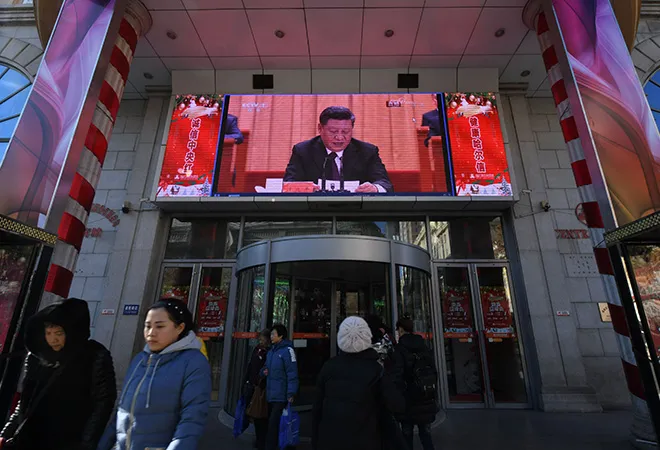-
CENTRES
Progammes & Centres
Location
China remains a superpower in the making but its journey has now become profoundly more difficult

The year 2018 is ending with the story of China’s rise becoming more complicated than ever. China has seen its stock fall dramatically over the last year and this is remarkably new in contemporary global political and economic discourse. The arrival of Donald Trump as the US president was initially viewed as an opportunity that Beijing needed to shine on the global stage. Instead, Washington’s hard line against China, the West posing as a unified front, troubles on the domestic economic front and the challenges confronting the Belt and Road Initiative (BRI) have all diminished the aura around China and one of its most powerful leaders, Xi Jinping.
The recent arrest of Huawei’s chief financial officer, Meng Wanzhou, by Canada in response to a US extradition request on the grounds of suspected money-laundering designed to mask evading US trade sanctions imposed on Iran is the latest flashpoint in Sino-US relations. Huawei is China’s largest telecom-equipment maker and its new 5G (fifth-generation wireless) network is being accused by the West of being a tool for cyber espionage.
China’s response to the arrest has further underscored Beijing’s penchant for reckless behaviour. In order to teach Canada a lesson, Beijing has detained two Canadians—Michael Kovrig, a former diplomat, and Michael Spavor, an entrepreneur. Where Meng’s detention was transparent as per Canada’s international legal commitments, China’s behaviour has been arbitrary with their alleged crimes being limited “suspicion of engaging in activities that harm China’s state security”. Also, interesting is how China is trying to browbeat Canada even when Meng has been arrested at the behest of the US.
This will further alienate the West and push it into great coordinated policy responses vis-à-vis Beijing. Already the US, the UK, Canada, Australia and New Zealand (the “Five Eyes”) have decided to work more closely in sharing intelligence on China’s foreign activities even as they have been reassessing the security implications of Chinese involvement in their domestic 5G technology and networks. After the Trump administration signed a bill banning government use of Huawei and ZTE technology as part of its broader Defence Authorisation Act earlier this year following accusations that Beijing has been stealing valuable technological know-how from American companies, many other Western governments have begun to respond in a similar manner and wider worldwide coalition is in the offing.
For the US, its technological superiority is what drives its global supremacy, therefore it is intricately linked with national security. This is especially true when it comes to the race to dominate frontier areas such as Artificial Intelligence, quantum computing and next-generation internet. In America, there have been some very strong warnings about China’s growing technological capabilities even as last year Chinese President Xi had talked of technologies such as Artificial Intelligence, Big Data and the internet as key to transforming China into an advanced industrial economy in the coming decades. The two powers are now openly competing in the hi-tech space and this is just the start. But for China, which had relied on Western benevolence to further its interests with impunity, the clock is ticking.
The Trump administration’s tariff onslaught on China is also having an impact on domestic Chinese economy. Industrial production is down, retail sales are slumping and exports are weakening as China’s economic growth slowed to 6.5% in the third quarter, the weakest pace since the global financial crisis. The head of China’s top economic planning agency has suggested it would roll out more supportive measures to boost the economy especially in the advanced manufacturing sector. But it will not be easy for the Chinese government to use public spending to boost investments due to its mounting debt which Chinese authorities had been trying to rein in.
Protectionist tendencies are rising around the world and China will find that its relationship with other major powers will be shaped by how much reciprocity it can offer, not a traditionally strong point of Beijing.
Even as the domestic economy’s challenges are mounting, the BRI, which was Xi’s flagship project akin to the Marshall Plan, is now facing unrelenting global hostility. Many of its large projects have turned into white elephants and even some of China’s closest partners are questioning its value. Corruption and incompetence have shaped responses to these projects as complaints are mounting and the leverage of smaller states is on the rise. Alternatives are now being offered by countries as diverse as the US, Japan, India, Australia and Europe, fuelling resentment against China’s exploitative approach.
Beijing’s “debt trap” diplomacy, much in vogue for the past few years, has been outed and is on its way to become passé. While Malaysian Prime Minister Mahathir Mohamad has forced the Chinese to reconsider the controversial East Coast Rail Link, Myanmar managed a reduction in the price of the Kyaukpyu deep-sea port from $7.2 billion to $1.3 billion. The BRI is now shorn of all glitter and hard-nosed bargaining will now shape the project’s future.
China remains a superpower in the making but its journey towards that goal has become profoundly more difficult.
This commentary originally appeared in Live Mint.
The views expressed above belong to the author(s). ORF research and analyses now available on Telegram! Click here to access our curated content — blogs, longforms and interviews.

Professor Harsh V. Pant is Vice President – Studies and Foreign Policy at Observer Research Foundation, New Delhi. He is a Professor of International Relations ...
Read More +